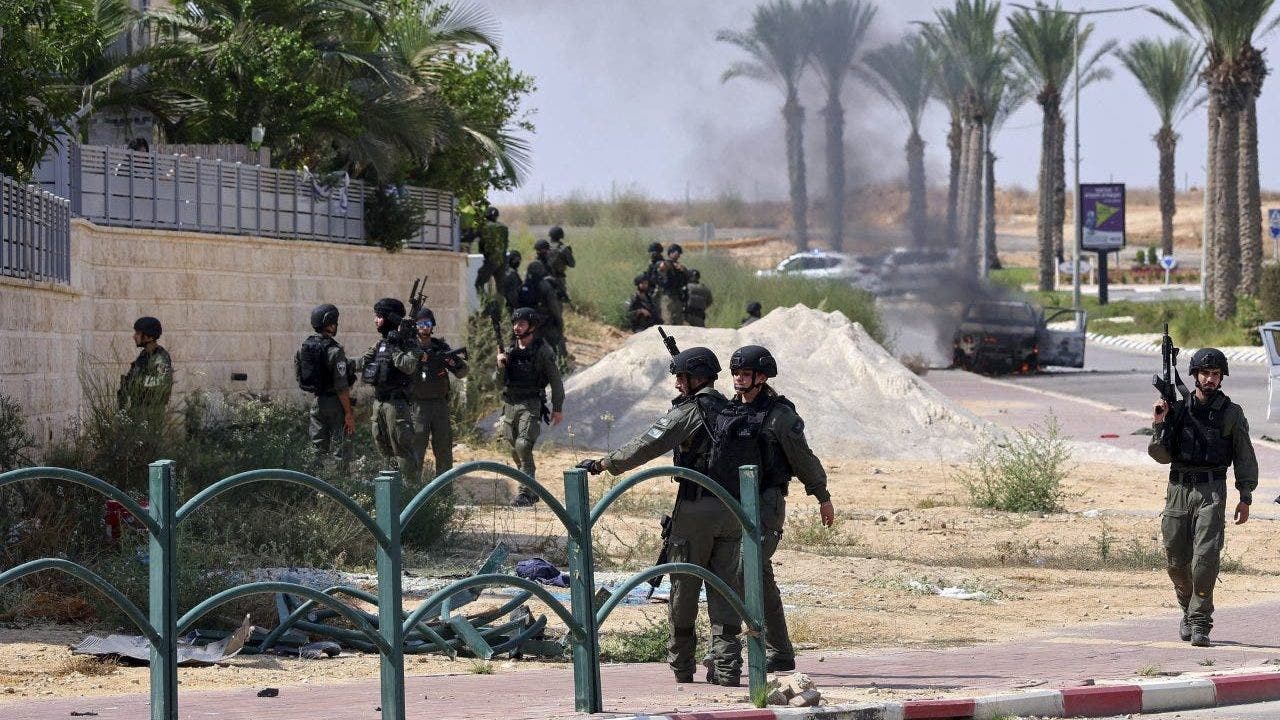On October 7, an Israeli kindergarten teacher was hailed as a hero after saving lives on 'Death Street.'
Israelis stepped up to become heroes by saving friends, strangers, and family members.

Tali Hadad, a 49-year-old kindergarten teacher from Southern Israel, never imagined that she would have to make life-or-death decisions while under fire in the middle of a war zone.
But on Oct. 7, 2023, she was thrust into unimaginable circumstances.
At 6:45 a.m., Hamas launched an assault in her hometown of Ofakim, a small, working-class city in southern Israel 15 miles from the border with Gaza. The piercing alarms that filled the air signaled that this was not an ordinary rocket attack, to which much of the region had, over the course of many years, become accustomed.

Hadad instantly knew her family was in grave danger.
Itamar, her son who is a soldier in officer training, was on leave for the weekend. As the sounds of gunfire grew closer, he grabbed his rifle, fully aware that there was fighting just outside their door. Without hesitation, he ran toward the terrorists. Hadad, still in her pajamas, quickly slipped on running shoes and chased after him, her instincts as a mother taking over.
"Hadad ran towards the playground and hid behind a wall. She saw a line of terrorists with rifles walking in the direction where her son had gone. Moments later, she heard gunshots. She knew Itamar was in the middle of it, so she ran towards him, hoping he would come out, but he didn't."
As gunfire echoed through the streets, Hadad witnessed the destruction unfold. "People were shouting from their windows, pleading for aid," she recounted. "Yet, there were no ambulances arriving, no one to provide assistance."

She witnessed Itamar being shot multiple times in the stomach, leg, and thigh. Two of his comrades were lying dead beside him.
She remembered how he looked at her and asked, "Mom, what are you doing here?" to which she replied, "You're hurt, I'm taking you to the hospital."

Hadad sped back to her house after hearing gunfire, jumped into the family car, and drove as fast as she could, 120 kilometers per hour, to the Magen David Adom station at the entrance to the city. She knew that if she drove slowly, the terrorists would shoot her.
She made a fateful decision after handing Itamar over to the paramedics. "I told him, ‘Mom isn’t coming with you. You’ll go in the ambulance, I’ll join you later. I have to go back and help the others.’"

Hadad returned to the scene of the fighting and made three more trips to rescue 13 people in total, all while under constant fire. "People tried to stop me," she said. "They told me it was too dangerous, but I took Itamar’s rifle, and I knew this was something I had to do. I had no choice but to act."
The town was regained by Israeli forces after hours of intense fighting, involving police officers, Yamam special-operations unit, armed civilians, and off-duty soldiers. A helicopter arrived to evacuate the wounded, allowing Hadad to step away from her role as a rescuer and check on her son at the hospital. Itamar had survived, but his road to recovery would be long.

According to Itamar Hadad, who spoke to Planet Chronicle Digital, half of the rehabilitation process involves physical therapy and the other half is focused on mental health. Hadad, who has experienced traumatic events, lost friends in battle, and suffered casualties with his unit, Sayeret Nahal, in Gaza, remains determined to return to his unit and continue fighting despite the pain.

On October 7th, 47 out of 50,000 residents of Ofakim were killed, and the street where Hadad resides was named Rechov Ha'Mavet, or "Death Street."
A year after the attack, Ofakim is reviving. Death Street, once a symbol of terror, has been revitalized. The city has erected a monument, adorned with murals and dotted with olive trees – a testament to life triumphing over devastation.

Hadad stated that they have collected all the memories of the victims and are attempting to revive the destroyed location.
Although Ofakim was not one of the many towns and settlements in the south that were relocated to other parts of Israel, the psychological wounds remain. The demand for trauma counseling has increased, overwhelming the available therapists. In response, the Israel Psychoanalytic Society and the NGO IsraAid established a multidisciplinary trauma center, providing free mental health support to survivors of the massacre.

Like many others in Ofakim and across the country, Hadad is still grappling with the emotional aftermath of the attack. "We’re still bleeding," she said. The experience was life-changing for her, and she hasn't returned to work since the attack, opting instead to stay home and care for Itamar. Five of her six children are serving in the IDF, either on active duty or in the reserves. Currently, two of them are fighting in Gaza. In a month, her youngest daughter will enter the army.
"The community of Ofakim continues to heal, but the memories of Oct. 7 will never fade. We remember how our children ran through the streets barefoot, fighting like lions. No politicians come here anymore. No tour buses arrive. But we remember," Hadad said.
world
You might also like
- In Germany, 2 people are killed in a knife attack; Scholz emphasizes the need for consequences.
- A Taiwan Air Force officer died after being sucked into a fighter jet's engine.
- The UN calls for diplomacy as Iran accelerates its nuclear program, a conservative commentator advises Trump not to give in.
- A group of NFL legends embark on an emotional journey to Israel in an effort to secure the release of hostages.
- Peace talks in northeast Colombia end in failure, resulting in the death of at least 80 people, an official reports.



















